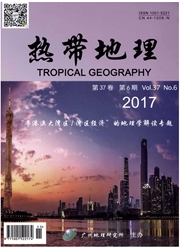

 中文摘要:
中文摘要:
改革开放以来,中国大规模的人口流动对资源的优化配置和经济快速发展产生了深远的影响。然而,中国的农村劳动力流动正逐渐从单向转变为城乡双向流动的格局,这一变化无疑将深刻影响我国农村地区的发展前景。文中采用对广东省云浮市农户的调查数据,通过构建Logistic模型,从农村外出劳动力个体行为决策的视角探讨农村劳动力回流的影响因素。实证研究表明:人力资本较低,年龄偏大,家庭儿童数量较多、老人数量较少和已婚的外出劳动力回流的可能性较大;而外出务工时间对回流概率的影响呈倒u型分布;家乡的非农就业机会与村庄的区位因素也显著影响了劳动力的回流决策,家乡就业机会越多,距离县城越近的村庄,其劳动力越有可能回流;而家庭人均耕地面积与性别变量的影响不显著。
 英文摘要:
英文摘要:
Mass migration movements from countryside to city have exerted an enormous influence on allocation of resources and economic development in China since Reform and Opening-Up. At present, the pattern of the movements has changed from unidirectional flow between cities and countryside to bidirectional, that will profoundly produce influence to the prospect of economic development in rural China. Establishing a Logistic model for employment behavior of rural labor with the data from peasant-household- survey in Yunfu, Guangdong, the paper explores the determinants of the return migration from cities. The result of the empirical study shows that those people who are of older ages, have lower human resource, more children and have been married have bigger possibility of return. And the effect of out-migration time on the probability of return presents a converse-U-shape distribution. Moreover, the chances of finding a job at hometown and the location of the village also exert influence over migration workers' decision about returning home. Those migration workers whose hometown has more employment opportunity and whose village is closer to county town have bigger possibility of return. The variables of gender and per capita arable land have no significant effect on returning home.
 同期刊论文项目
同期刊论文项目
 同项目期刊论文
同项目期刊论文
 期刊信息
期刊信息
